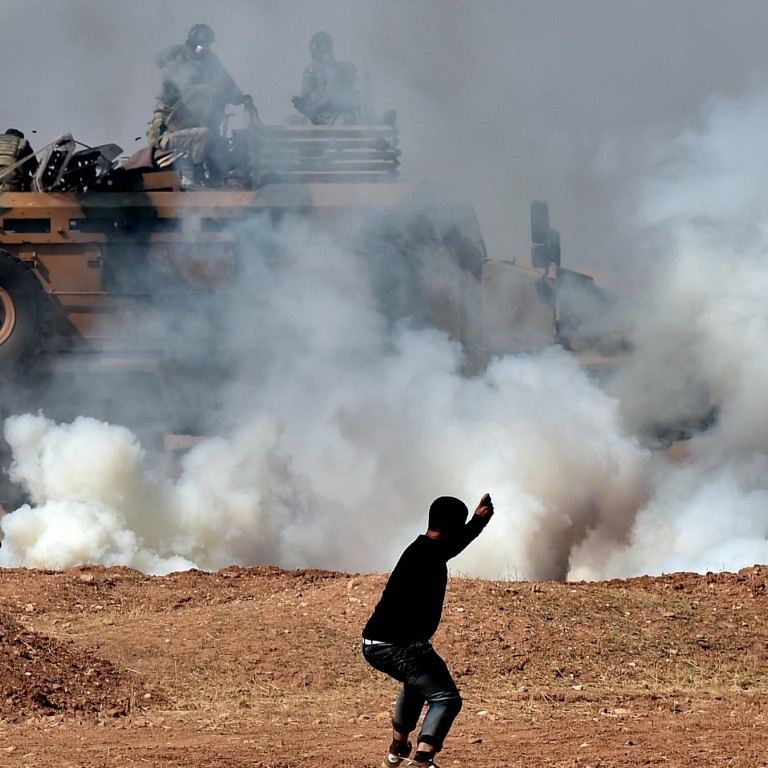
Syrian border town is 'about to fall', warns Turkey
Islamic State jihadis on verge of taking Kobani after three-week assault that killed hundreds, putting pressure on Erdogan to join coalition
Turkey's president said the Syrian Kurdish town of Kobani was "about to fall" as Islamic State fighters pressed home a three-week assault that has cost a reported 400 lives and forced thousands to flee their homes.
The prospect that the town could be captured by Islamic State, who are now within city limits, has increased pressure on Turkey to join an international coalition to fight the jihadis.
Islamic State wants to take Kobani in order to strengthen its grip on the border area and consolidate the territorial gains it has made in Iraq and Syria in recent months. US-led air strikes have so far failed to prevent its advance on Kobani.
Turkish President Recep Tayyip Erdogan said bombing was not enough to defeat Islamic State and he set out Turkey's demands for additional measures before it could intervene.
"The problem ... cannot be solved via air bombardment. Right now ... Kobani is about to fall," he said during a visit to a camp for Syrian refugees.
"We had warned the West. We wanted three things. No-fly zone, a secure zone parallel to that, and the training of moderate Syrian rebels," he said.
He said Turkey would act if there were threats to Turkish soldiers guarding an historic site in Syria that Ankara regards as its territory.
But so far Turkey has made no move to get involved in the fighting across the border.
Further pressure came from France, which said it was vital to stop Islamic State's advance on Kobani, and was discussing with Turkey what could be done.
"A lot is at stake in Kobani and everything must be done so that the [Islamic State] terrorists are stopped and pushed back," Foreign Minister Laurent Fabius told parliament.
But some analysts doubt the will exists among Western allies to take further action.
"It's the coalition of the unwilling, each country is doing the bare minimum, particularly in Syria," said Fadi Hakura at the London based think-tank, Chatham House.
From across the Turkish border, two Islamic State flags could be seen flying over the eastern side of Kobani.
The Syrian Observatory for Human Rights monitoring group said it had documented 412 deaths of civilians and fighters during the three-week battle.
The US military said it and allied air forces launched strikes in Syria on Monday and yesterday. In the Kobani area the raids destroyed armed vehicles, a tank and a vehicle carrying anti-aircraft artillery.
Two months into the American campaign, the US military has added a new weapon to its arsenal in Iraq, using Apache helicopters for the first time, US officials said on Monday.
Islamic State's advance has prompted 180,000 people to flee into Turkey from the region.
More than 2,000 Syrian Kurds including women and children were evacuated from the town after the latest fighting, a member of the Kurdish Democratic Union Party said on Monday.
While the battle raged in Kobani, more than 20 Turkish tanks were parked on a hillside 1km from the border.
Groups of mainly men travelled towards the border area to protest against inaction by Turkey to protect Kobani. Turkish police fired tear gas and water cannon at dozens of demonstrators in a field near the border.
Thousands across Turkey's predominantly Kurdish southeast have taken to the streets protesting in solidarity for Kobani.
One young pro-Kurdish protester was killed in the southeastern city of Mus while police used tear gas and water canon to disperse angry protests in Istanbul.
Clashes also took place in Ankara, with several police injured.
In Geneva, angry Kurds held a protest at the United Nations, while in Brussels they invaded the European Parliament. They waved flags bearing the portrait of jailed Kurdish Workers Party leader Abdullah Ocalan.
Priest and 20 Christians abducted
Al-Qaeda-affiliated jihadis in Syria have seized a priest and 20 other Christians in the latest abduction by militants in the war-torn country, the Franciscan Order said yesterday.

It said his abductors were "linked" to al-Qaeda affiliate the al-Nusra Front, and added that after the incident an unspecified number of Franciscan nuns took refuge with the villagers.
Qunyeh is a village of several hundred people, some 8km from the border with Turkey.
Senior Franciscan official Father Pierbattista Pizzaballa, Custos of the Holy Land, said the 62-year-old priest was seized along with 20 villagers.
"He has been kidnapped," he said in Jerusalem, expressing deep concern over the fate of the priest, a Syrian who has worked in Qunyeh for 12 years.
"They are accusing them of being collaborators" with the regime of President Bashar al-Assad, Pizzaballa said, insisting this was not true.
"We don't know what to do. We don't know with whom to talk, we're totally unable to get in touch with anyone," added Pizzaballa, the guardian of the Catholic Church's sites in the Holy Land.

